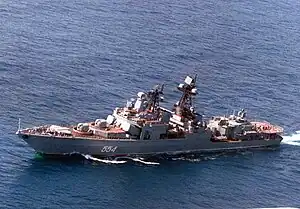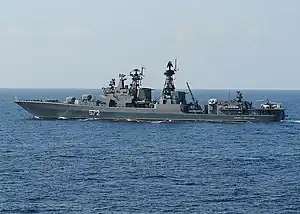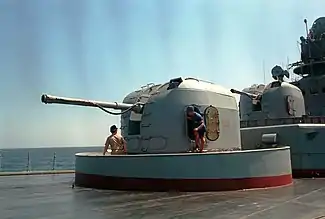 Admiral Vinogradov underway in 1992 | |
| History | |
|---|---|
| Name | Admiral Vinogradov |
| Namesake | Nikolai Ignatevich Vinogradov |
| Laid down | 5 February 1986 |
| Launched | 4 June 1987 |
| Commissioned | 30 December 1988 |
| Status | Undergoing refit |
| General characteristics | |
| Class and type | Udaloy-class destroyer |
| Displacement |
|
| Length | 162.99 m (534 ft 9 in) |
| Beam | 19.30 m (63 ft 4 in) |
| Draught | 6.20 m (20 ft 4 in) |
| Propulsion | 2 shaft COGAG, 4 gas turbines, 89,000 kW (120,000 hp) |
| Speed | 35 knots (65 km/h; 40 mph) |
| Range | 10,500 nautical miles (19,400 km) at 14 knots (26 km/h; 16 mph) |
| Complement | 300 |
| Armament |
|
| Aircraft carried | 2 x Ka-27 'Helix' series helicopters |
| Aviation facilities | Helicopter deck and hangar |
Admiral Vinogradov is an Udaloy-class destroyer of the Russian Navy; it is currently active with the Russian Pacific Fleet. It is named for Admiral Nikolai Ignatevich Vinogradov.
History

Admiral Vinogradov was laid down in the former Soviet Union in February 1986 and was launched in June 1987. The ship was commissioned and joined the Pacific Fleet on 30 December 1988. In August 1990, she was one of three Soviet warships to visit San Diego, California.[1] After the fall of the Soviet regime in 1991 the destroyer joined the new Russian Navy.
Admiral Vinogradov was deployed to the Persian Gulf alongside UK and NATO ships to enforce United Nations (UN) resolutions on Iraq in September 1992 along with the Russian tanker Boris Butoma.[2]
On 17 November 2010, the ship left Vladivostok to Gulf of Aden to participate in the UN anti-piracy mission of the Horn of Africa.[3] The ship was seen shadowing several US naval vessels during the RIMPAC 2016 naval exercise near Hawaii.[4] In September 2016 the destroyer participated in the joint Russian-Chinese exercise in the South China Sea.[5]
On 7 June 2019, Admiral Vinogradov came close to colliding with USS Chancellorsville. Each side blamed the other for the near collision.[6] Russian sources stated that the incident occurred in the southeast of the East China Sea while US sources named the location as in the Philippine Sea.[6] The Russian Navy claimed that the US ship made an unsafe maneuver, with Admiral Vinogradov forced to change course in order to avoid a collision.[7] The Russian military also claimed to have sent a protest to the US Navy. However, according to retired US Navy captain Carl Schuster, the Russian ship's wake shows that it "didn't adhere to either the rules of the road or the incidents at sea agreement."[8] United States Seventh Fleet spokesman Commander Clayton Doss said the Russian destroyer came within 50 to 100 feet (15 to 30 m) of USS Chancellorsville, "putting the safety of her crew and ship at risk." As of 2020, Admiral Vinogradov entered refit to upgrade to the standard of her sister ship, Marshal Shaposhnikov.[9] She is expected to return to service in 2024–2025.[10][11]
Gallery
References
- ↑ Zamichow, Nora (1 August 1990). "Three Soviet Warships Sail Into San Diego". Los Angeles Times. Retrieved 7 June 2019.
- ↑ "Russia Sending Two Warships to Gulf". The Washington Post. 2 September 1992. Retrieved 17 April 2021.
- ↑ "Another Pacific Fleet task force sailed off to fight piracy". Rusnavy.com. 17 November 2010. Archived from the original on 15 February 2018. Retrieved 7 July 2015.
- ↑ Eckstein, Megan (18 July 2016). "Russian Destroyer Shadows USS America Near Hawaii". USNI News. Retrieved 7 June 2019.
- ↑ "Ship detachment of the Pacific Fleet returned to Vladivostok after participating in the Naval Interaction-2016 exercise". Ministry of Defence of the Russian Federation. 24 October 2016. Archived from the original on 24 October 2016. Retrieved 17 April 2021.
- 1 2 "Russian and US warships almost collide in East China Sea". BBC News. 7 June 2019. Retrieved 7 June 2019.
- ↑ "US and Russia blame each other after warships nearly collide". The Guardian. Associated Press. 7 June 2019. ISSN 0261-3077. Retrieved 17 April 2021.
- ↑ Lendon, Brad; Starr, Barbara & Cohen, Zachary (7 June 2019). "US and Russian warships nearly collide in the Pacific". CNN. Retrieved 7 June 2019.
- ↑ "Russia plans to upgrade Admiral Vinogradov antisubmarine ship". navyrecognition.com. December 2020. Retrieved 17 April 2021.
- ↑ "Russia to upgrade submarine Irkutsk and destroyer Admiral Vinogradov in 2022". navyrecognition.com. 30 March 2022. Retrieved 23 December 2022.
- ↑ "СМИ узнали о новых возможностях "Адмирала Виноградова" после превращения во фрегат". flot.com (in Russian). 12 December 2022. Retrieved 23 December 2022.
External links
 Media related to Admiral Vinogradov (ship, 1987) at Wikimedia Commons
Media related to Admiral Vinogradov (ship, 1987) at Wikimedia Commons







